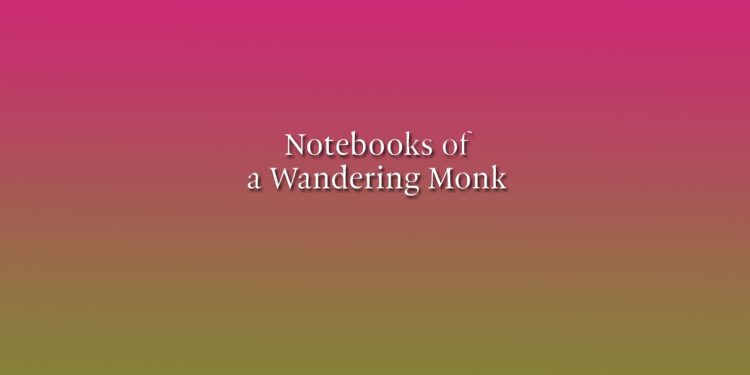Notebooks of a Wandering Monk by Matthieu Ricard – Review

By Barney Bardsley
The life journey of Matthieu Ricard, explored here in his lengthy autobiography, is not that of a faint-hearted man. Since the age of 21, and for the past five decades, he has followed a Buddhist path, studying and serving at the feet of the great Tibetan spiritual masters, and living out his days in hermitages and monasteries across Bhutan, Tibet and Nepal, with a devotion that is both touching and awe inspiring. If his story is an epic one, so too is his capacity for writing about it – this book weighs in at a whopping 700 pages, and he has written many more books beside it, in a fervent desire to explain the wonderful intricacies of Buddhism to a still largely ignorant western public. To read this tome is to be overwhelmed by a wealth of intricate detail about the esoteric nuances of this mystical mountain culture, and much of it, to be honest, will go straight over a layperson’s head. But at the heart of it is a sincere and beautiful account of dedication: a dedication to some exceptional spiritual teachers, and to the search for a truly compassionate, simple and good life.
Matthieu Ricard first became known on an international level when he collaborated with his philosopher journalist father, Jean-Francois Revel, on a book called The Monk and the Philosopher. This conversation between father and son, about science and ethics, and the meaning of life itself, caught the public imagination, and catapulted Ricard out of his humble hermitage in Nepal and onto the world stage. But prior to that he had been a humble monk, living out his days as a disciple, first to Kangyur Rinpoche in Darjeeling, and then to the majestic and greatly revered Dilgo Khyentse Rinpoche in Bhutan.
For someone who started out as a young French scientist at the Institut Pasteur, working in molecular biology and cellular genetics, his subsequent career as a fully fledged Buddhist monk – later to be French interpreter to the Dalai Lama, and a distinguished translator and archivist of sacred Tibetan texts, seems remarkable, implausible even. But Buddhism is known to be a discipline of the mind, with its adepts constantly enquiring as to the nature of reality and truth, so there is more harmony, perhaps, in Ricard’s life course, than at first appears.
This is, truly, a remarkable account of an exceptional life. Not only has Ricard served right at the heart of Tibetan Buddhist culture, working to keep its traditions alive and flourishing, despite the consistent, cruel attempts by the Chinese regime to destroy it, he has also spent a fortune (earned from the success of his many books) on establishing schools and clinics throughout the Far East, combating the extreme poverty of these remote mountain regions with a compassion and dedication that is entirely admirable.
“Love and devotion”
 There is a reason why this part of the world exerts such a hold on our imagination. It is a deeply mysterious place, full both of jaw droppingly beautiful vistas, and terrifying, brutal extremes. Some of the journeys Ricard undertakes, across vertiginous ravines, up steep mountains and over vast uninhabited plateaus, make one wonder how it is possible for people to survive here at all – let alone to build beautiful monasteries, that cling to the rock face like holy limpets, with a trust in the power of faith alone – or so it seems – to keep body, soul and buildings together.
There is a reason why this part of the world exerts such a hold on our imagination. It is a deeply mysterious place, full both of jaw droppingly beautiful vistas, and terrifying, brutal extremes. Some of the journeys Ricard undertakes, across vertiginous ravines, up steep mountains and over vast uninhabited plateaus, make one wonder how it is possible for people to survive here at all – let alone to build beautiful monasteries, that cling to the rock face like holy limpets, with a trust in the power of faith alone – or so it seems – to keep body, soul and buildings together.
Then there are the people themselves, powerful as pit ponies, ever-resilient amidst their scant resources, and smiling through adversity with a genuine, glowing contentment, all of which is a better advert for Buddhism than a million liturgical texts. Ricard, to add to his many achievements, is a fine photographer, and there are several in this book that beautifully illustrate the descriptions of the places and people he has seen.
A major figure in all these pictures is the towering figure of Dilgo Khyentse Rinpoche. Ricard describes him thus: “…Khyentse Rinpoche was a very impressive person, not only because of his height – he was almost six and a half feet tall – but also because of his majestic bearing, brimming with a goodness that radiated from his being. His amber skin, his big gentle hands, his fingers and long fingernails, his poised gestures, his warm voice, his immeasurably penetrating gaze, the boundless generosity heralded in his smile – everything about him left an indelible mark on all who knew him.”
The love and devotion Ricard showed towards Dilgo Rinpoche until his death – sleeping on the floor by his side, night after night, and attentive to his every need, the older and sicker his teacher became – is something that we in the West might feel uncomfortable with. Is this a wise way to spend one’s life, in a culture so remote from one’s own, and living a spartan, sometimes painful existence, day to day, year after year, in pursuit of something so ephemeral, ungraspable, and hard to explain as enlightenment?
Well, to judge by the smiling face of Matthieu Ricard, emanating from the cover of this book, and from his descriptions of such happiness and fulfilment in his simple daily life, then the answer must be a resounding YES! And to read the account, right at the end of the book, of the scene that greets him every morning, in his remote Nepal hermitage, is only to feel envy of what he has – and to be pleased at the delight that he has found for himself, right there, on the very roof of the world: ” At Namo Buddha hermitage, the stars are still visible when the first glimmer of dawn appears. The Himalayas are silhouetted against a bluish-grey sky. The mountains turn a crimson pink; then comes the magic moment when the first peak, more than 26,000 feet high, hooks the rays of the rising sun and bursts into orange flame. The entire chain is soon ablaze, and then the raking light illuminates the sea of clouds spread out at the foot of the mountains, covering the valleys, which will remain deep in fog for the next hour. It is the dawn of a tranquil morning.”
‘Notebooks of a Wandering Monk’ by Matthieu Ricard is published by MIT









